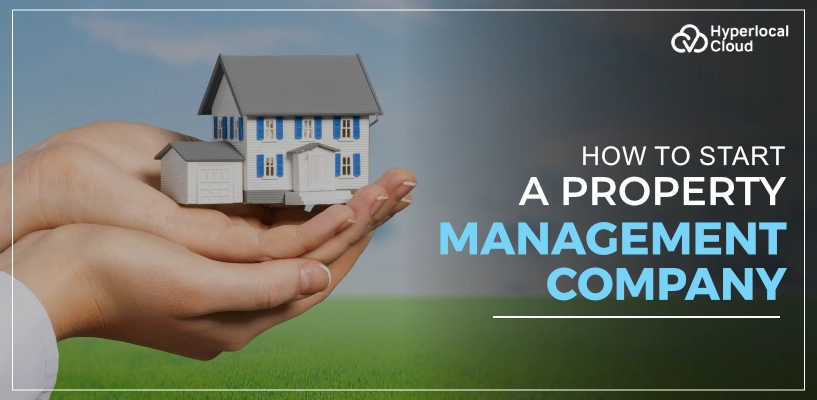How To Start A Property Management Company

The real estate industry has always been an attractive field, but in recent years, a particular niche has gained remarkable speed, and it is property management. The demand for skilled property managers has increased as more people invest in rental homes, vacation homes, and commercial properties.
Startups or businesses looking to launch a property management company offer excellent service to facilitate individuals who are organized, skilled at interacting with people, and knowledgeable about property dynamics. Whether you are an investor seeking to control or manage your own business more efficiently or an entrepreneur looking for a profitable company, you are on the right track because the potential of this industry is very high.
According to recent reports, the global real estate or property management market is expected to grow with an annual growth rate of 8% in the coming years.
The property management industry currently benefits from trends such as the development of distance management equipment, an increase in short-term prices, and an increasing need for professional services among busy landlords. This growth is inspired by urbanization, an increase in real estate investment, and technological progress in property management software.
To understand everything in detail, stay tuned with the blog. The guide will let you know how to start a property management company by utilizing property management software. Additionally, you will gain a clear overview of the property management software benefits, features, and its revenue generation model.
Understand What is Property Management
Before diving into business planning, it is necessary to understand what property management really means. Property management is the daily operations, controls, and inspections of properties. These properties can be housing, commercial, or industrial. Property managers work on behalf of property owners to preserve the value of the property when generating revenue.
Some key responsibilities of property managers include:
- Advertising and filling vacancies
- Collecting rent
- Handling maintenance and repairs
- Dealing with tenant issues or complaints
- Managing leases and legal compliance
- Overseeing budgets and property finances
It is the responsibility of the property management company to ensure that properties are well-maintained and profitable. This will become easier for them if businesses or startups utilize property management software. Developing a property management software from scratch might be more expensive. However, for a better alternative, businesses can opt for white label property management software, which is scalable, affordable, reliable, and efficient.
Ready to launch your property management business?
The Comprehensive Types of Properties that a Property Management Company can Manage with Software
As a property management company, you will have access to a comprehensive range of properties where you can provide valuable insights to users. However, with the help of the property management software, it will become easy for you to target the specific niche by providing advanced features and functionalities to the users. You can also build a property management software for small landlords or for HOAs and Condo Associations. Here’s a detailed overview of the types of properties that you can manage with the help of property management software.
1. Single-Family Homes
These are standalone houses that are rented to individuals or families. Detached houses are common in suburban areas and are often owned by individual investors or landlords. The property management company leverages the white label home rental software to fulfill all the required operations.
2. Multi-Family Properties
These are buildings with two or more residential units, such as duplexes, triplexes, or apartment complexes. A short-term rental management software is in demand, as businesses or startups want to cater to the requirements of their users. With the help of this software, users can easily browse and book properties for themselves.
3. Commercial Properties
This includes office buildings, retail, warehouses, medical centers, and industrial plants. Rental and management processes are more trade-oriented than housing wealth.
4. Vacation Rentals & Short-Term Rentals
This is a night, weekly, or monthly-based property that is usually done with the help of a vacation rental platform like Vrbo or Booking.com.
5. HOAs and Condo Associations
The property management company can manage the operations of the associations and condominium boards of the household owners, which oversee shared communities. Unlike rental properties, the citizens usually own their homes, and you manage shared aspects of society.
6. Student Housing
Student housing includes home or apartment units rented by students for college or university. Students can easily browse and select rooms on the room rental website according to their convenience.
How To Start A Property Management Company?
There are numerous steps that businesses or startups need to consider before beginning their journey of reshaping the real estate market. Go through the information on how to start a property management company that you can follow:
Step 1: Understand the Role of a Property Manager
The first step is to understand the various roles of a property manager, whether you are planning to manage residential houses, apartments, commercial buildings, or vacation properties. A proper implementation is required to build a strong user base.
Step 2: Conduct Market Research
Take enough time to understand your local market and target followers in advance of jumping into the trustworthy estate market. This step helps you determine the demand, competition, and alternatives in the targeted field. By gathering this information, you effectively place your company and offer the services that meet the needs of the market.
Step 3: Develop a Business Plan
A solid business plan is the backbone of your company. It guides your features, helps with generating a good income, and takes into account your goals.
Here’s what to include in your business plan:
- Executive Summary
- Market Analysis
- Service Offering
- Marketing Plan
- Financial Plan
- Operational Plan
Step 4: Legal Structure and Licensing
You must legally establish your company by choosing some professional aspects that match the legal requirements.
- Limited Liability Company (LLC)
- Partnership
- Corporation
Each has its professionals and resistance to taxes, responsibilities, and paperwork. An LLC is often a popular choice for small to moderate-sized real estate management companies because of the security, balance, and simplicity.
Step 5: Set Up Your Finances
Effective management of money is important in property management. Start by opening your own business bank account to keep individual and commercial finance separated.
Other financial setups include:
- Accounting Software
- Client Trust Accounts
- Insurance
Step 6: Build Your Brand
Your brand represents the identity of your company. It should express professionalism, trust, and competence. Start by choosing a professional name, logo, and software or application. The development of a property management software is a crucial aspect that you can achieve by following two key steps. Businesses can develop the software from the ground up, which costs them a lot. Otherwise, businesses can utilize a white label solution to build a property management software that is quite affordable and efficient.
Step 7: Hire Staff and Build Your Team
As your business grows, handling everything alone will be challenging. Start building a reliable team that includes:
- Property Managers or Assistants
- Maintenance Technicians or Contractors
- Leasing Agents
- Accountants or Bookkeepers
- Administrative Staff
Make sure your team is trained in customer service, tenant laws, and maintenance processes. A strong team improves your reputation and lets the company grow more efficiently.
Step 8: Manage Properties and Build Client Relationships
When you are ready, you can start handling characteristics and offer extraordinary service. Always try to build long-term relationships with both property owners and tenants. You can achieve this by offering flexible and customizable service packages.
Advantages of Starting a Property Management Company
There are several advantages of starting a property management company. Some of the most relevant advantages are discussed below. Have a look:
1. Consistent and Recurring Revenue
Unlike many companies where income is unpredictable, property management companies benefit from stable and repetitive monthly revenues. Most companies require a management fee, which provides a steady cash flow, especially when managing more assets.
2. Low Overhead and Startup Costs
It is not necessary to open an office to start a property management company. Property managers can do their job from their homes by utilizing the property management software. This will save the cost and time of the startups or business owners.
3. Scalable Business Model
You can start by managing some properties and then scale up to dozens or hundreds of assets. As the customer base increases, you can expand your team and services.
4. Strong Market Demand
Demand for real estate services is increasing, especially in urban areas, high-end places, and rental areas. Busy landlords and real estate investors often prefer outsourcing management functions instead of handling them on their own.
5. Opportunities for Additional Revenue Streams
You can profit from premium services such as lease services, maintenance coordination fees, delay penalties, renewal of lease, and even interior design consultation or short-term price management.
Let’s build your dream business together
How is Property Management Software a Game-Changer?
Property management software is helpful and has become a game-changer for property managers. Below, you will find detailed information on how property management software works efficiently for property managers. Just have a look:
1. Centralized Management
Property management software brings everything to a centralized platform for tracking and communication, from rental collections to maintenance requests. It reduces the requirement for many units and systems.
2. Time and Cost Savings
The property management software helps property managers save time and cost, which they usually don’t save due to manual processing. The property managers utilize the software to focus on scaling the business or improving customer service.
3. Professionalism and Transparency
Using property management software helps you present a professional image to customers and tenants. The property managers can log on to the portals to see the real-time report, and tenants can easily pay or ask for maintenance online.
4. Better Tenant and Owner Experiences
From the payment of online prices to 24/7 maintenance request tracking, the software improves the tenant’s experience, resulting in high satisfaction and tenant retention.
5. Scalability and Growth
As your real estate portfolio grows, it becomes complex to manage. Software allows you to manage more characteristics with the same or small teams, so you can develop your income without being proportional to your costs.
The Benefits of Investing in Property Management Software
Choosing the right property management software is like investing in an all-in-one marketplace that fulfills the requirements of all the niches. You can get the benefits of the property management software below.
1. Automated Rent Collection
Collecting rent fees will take time and result in a delay. With software, tenants can pay online rent, automatically pay, and receive automatic reminders. You can immediately track who paid and who has not.
2. Maintenance Management
Instead of managing telephone calls and texts, tenants can present maintenance requests through an online portal. You can then assign the contractor, track progress, and communicate updates in the same system.
3. Accurate Financial Reporting
Property management software helps you track the exact items, including income, expenses, late fees, and owner payments. Most platforms provide financial reports that are ready to use, such as profits, ownership statements, and tax reports.
4. Customizable Lease Management
You can upload and save leases, track expiry dates, specify automated renewal notifications, and even integrate a digital signature to speed up the rental process. It reduces paperwork and improves compliance with the lease.
5. Communication Tools
Good property management software involves the underlying message system or email integration, providing fast, organized communication between tenants, owners, and your team. There is no more message or confusion.
6. Tenant and Owner Portals
With the help of the online portal of a property management software, tenants can easily pay their rent, update information, or submit service requests. In contrast, the property managers can view income, expenses, and performance.
The Emerging Features of Property Management Software
Property management software comes with a wide range of advanced features and functionalities, which is why it is in demand among businesses or startups that want to set a competitive approach in the real estate market. Go through the information below to understand the emerging features of the software.
1. Artificial Intelligence and Predictive Analytics
AI is now used to screen tenants, analyze market trends, and predict problems with property maintenance. This allows you to make active decisions and reduce unexpected costs.
2. Virtual Tours and E-Leasing
Several platforms integrate features such as the 3D virtual tour, online applications, and e-hosts, making it easier to rent properties without meetings. It is especially useful for tenants outside the city or when you are on a busy lease.
3. Chatbots and Automated Messaging
The feature includes an automatic chat that responds to tenant inquiries 24/7, resolving customer queries and providing satisfaction. You can also plan regular updates and reminders, so tenants never miss important messages.
4. Smart Home Integration
Smart locks, thermostats, and safety systems can now be integrated into real estate management platforms. It enables external access, automatic check-in, and even energy-saving functions for environmentally conscious landlords and tenants.
5. Multi-Channel Marketing Tools
Modern software allows you to automatically list tools on the rental marketplace platforms like Zillow and Craigslist. It streamlines your marketing process and reduces free time.
6. Automated Owner Disbursements
Instead of sending payments manually to the owners each month, the software can now automatically calculate and send, as well as financial summaries, directly to the owners’ bank accounts.
7. Mobile Inspections and Reporting
Uploading photos, digital checklists, and inspection systems with reporting makes it easier to document the terms of the property and share the report with the owners in real time.
Tell us your business idea—we’ll help you refine it!
Explore the Monetization Strategies to Generate Revenue from a Property Management Software
To generate revenue from the property management software, businesses or startups can consider several monetization strategies. The most important ones are mentioned below.
1. Subscription-Based Pricing
It is the most common and reliable revenue model for PMS suppliers. This involves loading users monthly, quarterly, or annually to access the software’s main functionalities. This model ensures approximate, recurrent revenue and encourages long-term customer inventory.
2. Freemium Model
The freemium approach provides a limited version of software for free, providing important tools such as tenant handling, basic renting of trekking and maintenance logs. Users can reach platforms without any cost, but more advanced features are closed behind a payment plan.
3. Transaction Fees
The PMS platform can generate revenue from transaction activities. For example, the platform can charge a small percentage of the rent collected through the integrated payment portal.
4. Advertising & Featured Listings
If a large user in PMS is a base or tenant supporting portal, it can serve as an advertising channel. This utilization strategy works best when the platform has high connection and traffic, which allows relevant advertising that does not interfere with the user experience.
5. Affiliate Marketing & Partnerships
In collaboration with additional services, PMS can generate associated income by recommending or integrating with third-party services. There is a low suitable flow that can be easily automated and collected with user journeys, especially during relocation or lease.
Conclusion
Starting a real estate or property management company can be rewarding and profitable, especially if you are organized, customer-focused, and have a solid understanding of how the business works in the real estate market. With the help of advanced property management software, businesses can streamline their operations and get proficient results. For this, you can get in touch with the experienced custom software development company.





